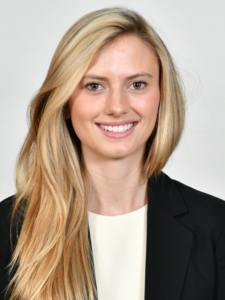By Emily Scott
If you’ve done even a little research into accounting careers, you’ve probably come across assurance, which is one of the main fields in accounting. In fact, it’s such a common entry point that the Vanderbilt Master of Accountancy (MAcc) program offers a track to prepare students for this very field. However, there’s a lot of confusion around what assurance actually is and what assurance professionals do on a daily basis. To get some clarity, we talked to 3 Vanderbilt MAcc graduates who all work in assurance to learn more about their careers.
What is assurance
In simple terms, assurance can be defined as helping clients make sure that their financial statements are accurate from start to finish by verifying records and accounting entries. Assurance services are commonly provided by Certified Public Accountants (CPAs), many of whom work at Big 4 firms.

Laura McLaughlin
For instance, Laura McLaughlin (MAcc’18) accepted a job in assurance at KPMG in Denver shortly after her graduation from Vanderbilt. Now a Senior Associate, McLaughlin works with her team to perform testwork and update clients so that their financial statements can be relied upon as materially correct. Her job specifically focuses on risk assessment and planning processes of engagements in order to determine when and how the audit should be conducted. “There is always plenty to do, so the day goes by quickly,” she said.
What are the day-to-day responsibilities in assurance
For employees working in assurance, what they do each day is dependent upon a host of factors, including (but not limited to) the type of client, the type of engagement, whether or not the client’s internal controls are being tested, if the client is a public or private company, when the client plans on releasing the report, and the size of the audit team.

Alexi Beavers
In her 3 years working as an Audit Senior at Ernst & Young in New York City, Alexi Beavers (MAcc’17) says that no 2 days have been the same. “Depending upon the factors above, I may meet with the client, work with the client’s internal audit team, or converse with Tax or Valuation Specialists in the United States, Europe, Asia, or other continents. I may physically find myself at my office, my client’s office or both on any given day,” she said. “What remains consistent is that I’m working directly with different members of my team each day either to prepare or review the information provided by the client to understand, test, and analyze the client’s processes and controls.”
How does a job in assurance differ from a job in valuation
Besides assurance, the other main track for entry-level accounting professionals is valuation. (The Vanderbilt MAcc program offers both assurance and valuation tracks to prepare students to enter either field.) While their work is slightly different, both assurance and valuation associates are necessary to ensure that the financial statement is done in a timely manner.
In fact, assurance associates frequently interact with valuation specialists when auditing private equity and hedge fund clients at Big 4 firms. “The valuation team within Ernst & Young aids those in assurance in opining upon the inputs and the conclusions the client has reached when running its valuation models for its various investments. Valuation then becomes one part of the larger audit,” Beavers explained.

Carter Chandler
“In assurance, we deal with the financial statement as a whole, while the Valuation Associates are specialists that look at certain aspects of the statement,” added Carter Chandler (MAcc’18), who is an Assurance Senior at EY in Atlanta. “Since (my client) Coca-Cola is such a big company, I work to test that their revenue figures are accurate in a lot of different ways. Day-to-day I’m managing the people that work for me, whether that be people here at Ernst & Young in Atlanta or our team in India, communicating with bosses to make sure that our work is done on time.”
What do you learn from working in assurance
From the very beginning of their careers, assurance professionals experience many opportunities for growth. In particular, assurance is a very people-centered career that requires teamwork, and associates say that they learn a lot from their coworkers and also their clients. “Each person, whether they are a member of the client’s team or my own, based on their background, point in their career, and personal experiences, has provided insight to me, whether directly or indirectly, on how to improve my work product, to provide better client-service, and to enhance my understanding of the mechanics of a well-run business and team,” Beavers said.
Chandler confirms that his job at EY has allowed him to build long-lasting relationships with colleagues. “Building relationships with my coworkers and completing tasks as a team makes the job worth it,” he said.
McLaughlin also says that each day is a new learning experience. “I work closely with new hires and interns at KPMG, and it’s hard for me to believe that I was in their shoes just 2 short years ago. Every single day is a learning opportunity,” she said.